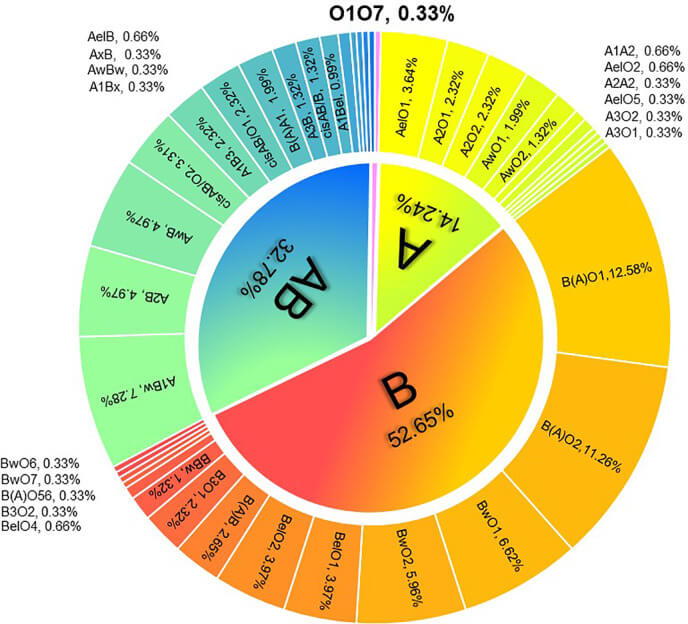Creative Biolabs provides customers with HLA typing services through polymerase chain reaction-sequencing based typing (PCR-SBT) technology. Our advanced SBT technology introduces dye-labeled primers and automatic fluorescence sequencing. The number of allele sequences in the sequencing template is limited by group-specific amplification, which avoids the interference to the detection results by DNA of the two haplotypes. It is one of the most accurate methods in the HLA typing field.
HLA is one of the most polymorphic genetic structures in the human genetic system and is composed of a series of closely related genes. The HLA gene is very important in the fields of medicine, anthropology, and forensics. With the development of molecular biology technology, the technical methods for HLA typing are becoming more and more perfect. Currently, PCR-SSP, PCR-SSOP, and PCR-SBT are the most widely used HLA typing methods allow a medium- or high-resolution throughput. The accuracy of these HLA typing methods is critical in medical applications, and in the transplantation of organs and tissues, if there is no correct pairing, it will lead to dangerous rejection. In the past few years, scientists have conducted several comparative studies between serology and DNA technology for HLA typing. And DNA technology is currently more reliable than serological techniques. However, DNA technology is not flawless, their accuracy depends on sensitive procedures conducted at specific temperatures, good DNA quality, adequate reagents, and also correct interpretation of the results.
One disadvantage of PCR-SSO or RFLP is that although they are capable of detecting single-base differences in DNA sequences between two alleles, they are less likely to detect new undefined alleles unless the variation happens to be at the specific site detected by the probe or the enzyme used for restriction. PCR-SBT was originally developed as a method of manual sequencing, did not require any additional typing information, e.g. serology, and was later applied to Class I alleles. Its superiority is the introduction of dye-labeled primers and fluorescent automated sequencing. This has greatly improved its accuracy. PCR-SBT is the only technique that directly detects the nucleotide sequence of an allele, so it can be accurately assigned. It requires very expensive equipment and complex laboratory methods to provide clear, high-resolution HLA typing results.
Creative Biolabs' newly developed PCR-SBT typing system can be used for high-resolution typing of HLA-A, HLA-B, and HLA-DRB genes. We use terminator sequencing reagents to minimize cost, increase efficiency, and complete the system by providing automatic allele calling and editing.
If you have any questions about our vector design service, you can contact us by email or send us an inquiry to find a complete solution.
Other optional ECIA™ HLA tissue typing service:
 Fig. 1 Distribution of ABO genotypes in 302 kidney transplantation candidates with ABO grouping discrepancies. (Yi Zhou, 2020)
Fig. 1 Distribution of ABO genotypes in 302 kidney transplantation candidates with ABO grouping discrepancies. (Yi Zhou, 2020)
The study utilizes sequence-specific primer (PCR-SSP) and sequence-based typing (PCR-SBT) based HLA Tissue Typing to address discrepancies in ABO blood typing for kidney transplant candidates, revealing significant mismatch rates between serotype and genotype. The research identifies high-risk cases of incorrect ABO typing which could potentially lead to graft rejection. Specifically, PCR-SBT was employed to precisely genotype the ABO blood group alleles, contributing to the detection of weak ABO subgroup alleles often missed by serological methods. This enhanced genotyping accuracy is crucial for the proper selection of kidney donors, ensuring compatibility and reducing the risk of transplant rejection. By applying PCR-SBT, the study advocates for a more reliable approach in clinical settings to determine donor compatibility, highlighting its importance in improving transplant outcomes.
PCR-SBT (Polymerase Chain Reaction with Sequence-Based Typing) is a method used for high-resolution typing of human leukocyte antigen (HLA) genes. This technique involves amplifying HLA gene segments through PCR and then sequencing the amplified product to identify specific HLA alleles, providing detailed genetic information critical for transplant compatibility.
PCR-SBT is preferred in transplant medicine because it provides high-resolution typing, capable of identifying specific HLA alleles including rare and new variants. This level of precision is crucial for matching organ donors and recipients accurately, significantly reducing the risk of graft rejection and enhancing transplant success.
PCR-SBT improves accuracy by directly sequencing DNA, allowing for the identification of the exact nucleotide sequence of HLA alleles. This eliminates the ambiguities often associated with other typing methods that rely on probe binding or pattern recognition, providing a definitive allele determination.
PCR-SBT can detect a wide range of HLA variations, including single nucleotide polymorphisms, small insertions, and deletions. However, its ability to detect large structural variations or copy number variations may be limited compared to other genomic techniques like next-generation sequencing (NGS).
The time required to obtain results from PCR-SBT can vary but typically takes several days. This includes time for PCR amplification, sequencing, and the subsequent data analysis. The exact time can depend on the throughput of the laboratory and the sequencing technology used.
High-resolution HLA typing, such as that provided by PCR-SBT, allows for more precise matching between donors and recipients, which is particularly critical for bone marrow and stem cell transplants. Better matches reduce the risk of graft-versus-host disease and other complications, improving overall patient outcomes.
PCR-SBT is also used in fields like immunogenetics for studying disease associations, pharmacogenomics for predicting drug response based on HLA type, and forensic science for individual identification in complex biological samples.
Use the resources in our library to help you understand your options and make critical decisions for your study.
All listed services and products are For Research Use Only. Do Not use in any diagnostic or therapeutic applications.
| USA:
Europe: Germany: |
|
|
Call us at: USA: UK: Germany: |
|
|
Fax:
|
|
| Email: info@creative-biolabs.com |
